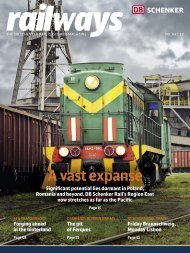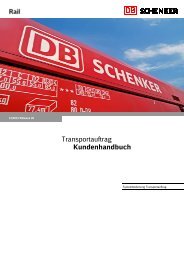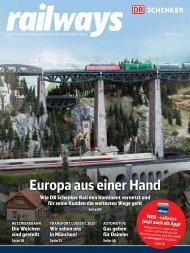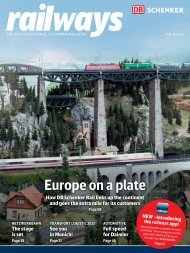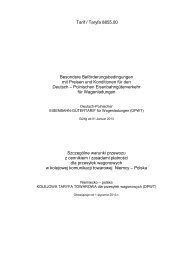PDF Download
PDF Download
PDF Download
You also want an ePaper? Increase the reach of your titles
YUMPU automatically turns print PDFs into web optimized ePapers that Google loves.
From left to right: Andreas Schulz, Sales Manager Intermodal<br />
Division of DB Schenker Rail, Hans Pieper, Managing Director of<br />
PKV and Armin Riedl, Managing Director of Combined Transport<br />
High-Performance Hub<br />
The second construction phase of the intermodal transport terminal in Duisburg is<br />
complete. Its importance for continental and maritime traffic continues to grow.<br />
Photos: DB AG , DB AG/Michael Neuhaus<br />
D<br />
uisburg is an important hub in European combined transport.<br />
It is here that the Combined Transport Planning<br />
Company [Planungsgesellschaft Kombinierter Verkehr<br />
PKV] operates the PKV terminal, one of Germany’s most important<br />
intermodal transport terminals. It is owned equally by<br />
DB Schenker Rail Deutschland AG and the operator Kombiverkehr<br />
AG.<br />
Containers, swap bodies and craneable trailers are transhipped<br />
in the PKV terminal, opening up a huge number of additional<br />
opportunities for connections within Europe for customers of<br />
Combined Transport. The terminal is the starting and finishing<br />
point for many national and international trains. Maritime and<br />
continental connections also link up here.<br />
Between its opening in 1992 and 2008, the transhipment of consignments<br />
in Duisburg has increased continuously to 185,000<br />
loading units a year. In 2009 the volume dropped to 175,000 consignments<br />
due to the global economic crisis. According to Hans<br />
Pieper, Managing Director of PKV, “The 6 percent drop is, however,<br />
well below the overall drop in Combined Transport. This is<br />
due to the huge importance of the PKV site in transit, for the<br />
European networks of freight operators. This year we anticipate<br />
an increase to approximately 190,000 units.“<br />
Important Milestone<br />
PKV has already begun the second expansion phase to further<br />
increase transhipment capacity and efficiency. The company announced<br />
the completion of the second construction phase on 22<br />
April 2010 after the number of tracks had been increased from<br />
six to nine in 2007. In this case track 9 was extended to a length<br />
of 780 metres thus increasing the terminal’s transhipment capacity<br />
to 220,000 loading units.<br />
Andreas Schulz, Sales Manager Intermodal Division of DB<br />
Schenker Rail Deutschland AG, explains, “Expansion of the PKV<br />
terminal is an important milestone in safeguarding the future of<br />
Combined Transport using customer-oriented traffic concepts.”<br />
Armin Riedl, Managing Director of Combined Transport, goes<br />
on, “The new length of track at this site is enormously important<br />
for the development of seaport-hinterland transport services.”<br />
Thanks to the new track it is now possible in the PKV terminal<br />
to tranship trains that are longer than the usual 600 metres without<br />
the need for complex and time-consuming shunting operations.<br />
“This speeds up transhipment and has a positive effect<br />
on the truck turnaround times.”<br />
Due to its excellent geographical location, the PKV Terminal<br />
Duisburg is an important building block in the European network<br />
of DB Schenker Rail’s Intermodal Division. Schulz says, “Duisburg<br />
is an important hub for our continental transport services<br />
and at the same time is a vital node for our maritime business.<br />
What’s more, we have the opportunity here to combine both<br />
segments. The expansion will help us to design our traffic concepts<br />
with even greater focus on the customer.“<br />
Contact | Andreas Schulz<br />
Phone: +49 (0)6131 15-67210 | andreas.ae.schulz@db-intermodal.com<br />
RAILWAYS | 31




